- Home
- Anthony Trollope
The Belton Estate Page 2
The Belton Estate Read online
Page 2
CHAPTER II.
THE HEIR PROPOSES TO VISIT HIS COUSINS.
It was full summer at Belton, and the sweet scent of the new hayfilled the porch of the old house with fragrance, as Clara sat therealone with her work. Immediately before the house door, between thatand the old tower, there stood one of Farmer Stovey's hay-carts, nowempty, with an old horse between the shafts looking as though he wereasleep in the sun. Immediately beyond the tower the men were loadinganother cart, and the women and children were chattering as theyraked the scattered remnants up to the rows. Under the shadow of theold tower, but in sight of Clara as she sat in the porch, there laythe small beer-barrels of the hay-makers, and three or four rakeswere standing erect against the old grey wall. It was now eleveno'clock, and Clara was waiting for her father, who was not yet outof his room. She had taken his breakfast to him in bed, as was hercustom; for he had fallen into idle ways, and the luxury of his bedwas, of all his remaining luxuries, the one that he liked the best.After a while he came down to her, having an open letter in his hand.Clara saw that he intended either to show it to her or to speak ofit, and asked him therefore, with some tone of interest in her voice,from whom it had come. But Mr. Amedroz was fretful at the moment, andinstead of answering her began to complain of his tenant's ill-usageof him.
"What has he got his cart there for? I haven't let him the road up tothe hall door. I suppose he will bring his things into the parlournext."
"I rather like it, papa."
"Do you? I can only say that you're lucky in your tastes. I don'tlike it, I can tell you."
"Mr. Stovey is out there. Shall I ask him to have the things movedfurther off?"
"No, my dear,--no. I must bear it, as I do all the rest of it. Whatdoes it matter? There'll be an end of it soon. He pays his rent, andI suppose he is right to do as he pleases. But I can't say that Ilike it."
"Am I to see the letter, papa?" she asked, wishing to turn his mindfrom the subject of the hay-cart.
"Well, yes. I brought it for you to see; though perhaps I should bedoing better if I burned it, and said nothing more about it. It is amost impudent production; and heartless,--very heartless."
Clara was accustomed to such complaints as these from her father.Everything that everybody did around him he would call heartless.The man pitied himself so much in his own misery, that he expectedto live in an atmosphere of pity from others; and though the pitydoubtless was there, he misdoubted it. He thought that Farmer Stoveywas cruel in that he had left the hay-cart near the house, to woundhis eyes by reminding him that he was no longer master of the groundbefore his own hall door. He thought that the women and children werecruel to chatter so near his ears. He almost accused his daughter ofcruelty, because she had told him that she liked the contiguity ofthe hay-making. Under such circumstances as those which enveloped himand her, was it not heartless in her to like anything? It seemed tohim that the whole world of Belton should be drowned in woe becauseof his misery.
"Where is it from, papa?" she asked.
"There, you may read it. Perhaps it is better that you should knowthat it has been written." Then she read the letter, which was asfollows:--
"Plaistow Hall, -- July, 186--."
Though she had never before seen the handwriting, she knew at oncefrom whence came the letter, for she had often heard of PlaistowHall. It was the name of the farm at which her distant cousin, WillBelton, lived, and her father had more than once been at the troubleof explaining to her, that though the place was called a hall, thehouse was no more than a farmhouse. He had never seen PlaistowHall, and had never been in Norfolk; but so much he could take uponhimself to say, "They call all the farms halls down there." It wasnot wonderful that he should dislike his heir; and, perhaps, notunnatural that he should show his dislike after this fashion. Clara,when she read the address, looked up into her father's face. "Youknow who it is now," he said. And then she read the letter.
Plaistow Hall, -- July, 186--.
MY DEAR SIR,
I have not written to you before since your bereavement, thinking it better to wait awhile; but I hope you have not taken me to be unkind in this, or have supposed me to be unmindful of your sorrow. Now I take up my pen, hoping that I may make you understand how greatly I was distressed by what has occurred. I believe I am now the nearest male relative that you have, and as such I am very anxious to be of service to you if it may be possible. Considering the closeness of our connection, and my position in reference to the property, it seems bad that we should never meet. I can assure you that you would find me very friendly if we could manage to come together.
I should think nothing of running across to Belton, if you would receive me at your house. I could come very well before harvest, if that would suit you, and would stay with you for a week. Pray give my kindest regards to my cousin Clara, whom I can only just remember as a very little girl. She was with her aunt at Perivale when I was at Belton as a boy. She shall find a friend in me if she wants a friend.
Your affectionate cousin,
W. BELTON.
Clara read the letter very slowly, so that she might make herselfsure of its tone and bearing before she was called upon by herfather to express her feeling respecting it. She knew that she wouldbe expected to abuse it violently, and to accuse the writer ofvulgarity, insolence, and cruelty; but she had already learned thatshe must not allow herself to accede to all her father's fantasies.For his sake, and for his protection, it was necessary that sheshould differ from him, and even contradict him. Were she not to doso, he would fall into a state of wailing and complaining that wouldexaggerate itself almost to idiotcy. And it was imperative thatshe herself should exercise her own opinion on many points, almostwithout reference to him. She alone knew how utterly destitute shewould be when he should die. He, in the first days of his agony, hadsobbed forth his remorse as to her ruin; but, even when doing so,he had comforted himself with the remembrance of Mrs. Winterfield'smoney, and Mrs. Winterfield's affection for his daughter. And theaunt, when she had declared her purpose to Clara, had told herselfthat the provision made for Clara by her father was sufficient. Toneither of them had Clara told her own position. She could not informher aunt that her father had given up to the poor reprobate who haddestroyed himself all that had been intended for her. Had she done soshe would have been asking her aunt for charity. Nor would she bringherself to add to her father's misery, by destroying the hopes whichstill supported him. She never spoke of her own position in regardto money, but she knew that it had become her duty to live a wary,watchful life, taking much upon herself in their impoverishedhousehold, and holding her own opinion against her father's when herdoing so became expedient. So she finished the letter in silence, anddid not speak at the moment when the movement of her eyes declaredthat she had completed the task.
"Well," said he.
"I do not think my cousin means badly."
"You don't! I do, then. I think he means very badly. What businesshas he to write to me, talking of his position?"
"I can't see anything amiss in his doing so, papa. I think he wishesto be friendly. The property will be his some day, and I don't seewhy that should not be mentioned, when there is occasion."
"Upon my word, Clara, you surprise me. But women never understanddelicacy in regard to money. They have so little to do with it,and think so little about it, that they have no occasion for suchdelicacy."
Clara could not help the thought that to her mind the subject waspresent with sufficient frequency to make delicacy very desirable,if only it were practicable. But of this she said nothing. "And whatanswer will you send to him, papa?" she asked.
"None at all. Why should I trouble myself to write to him?"
"I will take the trouble off your hands."
"And what will you say to him?"
"I will ask him to come here, as he proposes."
"Clara!"
"Why not, papa? He is the heir to the property, and why sho
uld henot be permitted to see it? There are many things in which hisco-operation with you might be a comfort to you. I can't tell youwhether the tenants and people are treating you well, but he can doso; and, moreover, I think he means to be kind. I do not see whywe should quarrel with our cousin because he is the heir to yourproperty. It is not through any doing of his own that he is so."
This reasoning had no effect upon Mr. Amedroz, but his daughter'sresolution carried the point against him in spite of his want ofreason. No letter was written that day, or on the next; but on theday following a formal note was sent off by Clara, in which Mr.Belton was told that Mr. Amedroz would be happy to receive him atBelton Castle. The letter was written by the daughter, but the fatherwas responsible for the formality. He sat over her while she wroteit, and nearly drove her distracted by discussing every word andphrase. At last, Clara was so annoyed with her own production, thatshe was almost tempted to write another letter unknown to her father;but the formal note went.
MY DEAR SIR,
I am desired by my father to say that he will be happy to receive you at Belton Castle, at the time fixed by yourself.
Yours truly,
CLARA AMEDROZ.
There was no more than that, but that had the desired effect; and byreturn of post there came a rejoinder, saying that Will Belton wouldbe at the Castle on the fifteenth of August. "They can do without mefor about ten days," he said in his postscript, writing in a familiartone, which did not seem to have been at all checked by the coldnessof his cousin's note,--"as our harvest will be late; but I must beback for a week's work before the partridges."
"Heartless! quite heartless!" Mr. Amedroz said as he read this."Partridges! to talk of partridges at such a time as this!"
Clara, however, would not acknowledge that she agreed with herfather; but she could not altogether restrain a feeling on her ownpart that her cousin's good humour towards her and Mr. Amedroz shouldhave been repressed by the tone of her letter to him. The man was tocome, however, and she would not judge of him until he was there.
In one house in the neighbourhood, and in only one, had Miss Amedroza friend with whom she was intimate; and as regarded even this singlefriend, the intimacy was the effect rather of circumstances than ofreal affection. She liked Mrs. Askerton, and saw her almost daily;but she could hardly tell herself that she loved her neighbour.
In the little town of Belton, close to the church, there stood apretty, small house, called Belton Cottage. It was so near the churchthat strangers always supposed it to be the parsonage; but therectory stood away out in the country, half a mile from the town,on the road to Redicote, and was a large house, three stories high,with grounds of its own, and very ugly. Here lived the old bachelorrector, seventy years of age, given much to long absences when hecould achieve them, and never on good terms with his bishop. His twocurates lived at Redicote, where there was a second church. BeltonCottage, which was occupied by Colonel Askerton and Mrs. Askerton,was on the Amedroz property, and had been hired some two years sinceby the Colonel, who was then a stranger in the country and altogetherunknown to the Belton people. But he had come there for shooting, andtherefore his coming had been understood. Even as long ago as twoyears since, there had been neither use nor propriety in keeping theshooting for the squire's son, and it had been let with the cottageto Colonel Askerton. So Colonel Askerton had come there with hiswife, and no one in the neighbourhood had known anything about them.Mr. Amedroz, with his daughter, had called upon them, and graduallythere had grown up an intimacy between Clara and Mrs. Askerton. Therewas an opening from the garden of Belton Cottage into the park, sothat familiar intercourse was easy, and Mrs. Askerton was a woman whoknew well how to make herself pleasant to such another woman as MissAmedroz.
The reader may as well know at once that rumours prejudicial to theAskertons reached Belton before they had been established therefor six months. At Taunton, which was twenty miles distant, theserumours were very rife, and there were people there who knew withaccuracy,--though, probably without a grain of truth in theiraccuracy,--every detail in the history of Mrs. Askerton's life. Andsomething, too, reached Clara's ears--something from old Mr. Wright,the rector, who loved scandal, and was very ill-natured. "A verynice woman," the rector had said; "but she does not seem to have anybelongings in particular." "She has got a husband," Clara had repliedwith some little indignation, for she had never loved Mr. Wright."Yes; I suppose she has got a husband." Then Clara had, in her ownjudgment, accused the rector of lying, evil-speaking, and slandering,and had increased the measure of her cordiality to Mrs. Askerton. Butsomething more she had heard on the same subject at Perivale. "Beforeyou throw yourself into close intimacy with the lady, I think youshould know something about her," Mrs. Winterfield had said to her."I do know something about her; I know that she has the manners andeducation of a lady, and that she is living affectionately with herhusband, who is devoted to her. What more ought I to know?" "If youreally do know all that, you know a great deal," Mrs. Winterfield hadreplied.
"Do you know anything against her, aunt?" Clara asked, after a pause.
There was another pause before Mrs. Winterfield answered. "Nomy dear; I cannot say that I do. But I think that young ladies,before they make intimate friendships, should be very sure of theirfriends."
"You have already acknowledged that I know a great deal about her,"Clara replied. And then the conversation was at an end. Clara had notbeen quite ingenuous, as she acknowledged to herself. She was awarethat her aunt would not permit herself to repeat rumours as to thetruth of which she had no absolute knowledge. She understood that theweakness of her aunt's caution was due to the old lady's sense ofcharity and dislike of slander. But Clara had buckled on her armourfor Mrs. Askerton, and was glad, therefore, to achieve her littlevictory. When we buckle on our armour in any cause, we are apt togo on buckling it, let the cause become as weak as it may; andClara continued her intimacy with Mrs. Askerton, although there wassomething in the lady's modes of speech, and something also in hermodes of thinking, which did not quite satisfy the aspirations ofMiss Amedroz as to a friend.
Colonel Askerton himself was a pleasant, quiet man, who seemed tobe contented with the life which he was leading. For six weeks inApril and May he would go up to town, leaving Mrs. Askerton at thecottage,--as to which, probably jovial, absence in the metropolisthere seemed to be no spirit of grudging on the part of the wife. Onthe first of September a friend would come to the cottage and remainthere for six weeks' shooting; and during the winter the Colonel andhis wife always went to Paris for a fortnight. Such had been theirlife for the last two years; and thus,--so said Mrs. Askerton toClara,--did they intend to live as long as they could keep thecottage at Belton. Society at Belton they had none, and,--as theysaid,--desired none. Between them and Mr. Wright there was only aspeaking acquaintance. The married curate at Redicote would notlet his wife call on Mrs. Askerton, and the unmarried curate was ahard-worked, clerical hack,--a parochial minister at all times andseasons, who went to no houses except the houses of the poor, and whowould hold communion with no man, and certainly with no woman, whowould not put up with clerical admonitions for Sunday backslidings.Mr. Amedroz himself neither received guests nor went as a guest toother men's houses. He would occasionally stand for a while at thegate of the Colonel's garden, and repeat the list of his own woes aslong as his neighbour would stand there to hear it. But there was nosociety at Belton, and Clara, as far as she herself was aware, wasthe only person with whom Mrs. Askerton held any social intercourse,except what she might have during her short annual holiday in Paris.
"Of course, you are right," she said, when Clara told her of theproposed coming of Mr. Belton. "If he turn out to be a good fellow,you will have gained a great deal. And should he be a bad fellow,you will have lost nothing. In either case you will know him, andconsidering how he stands towards you, that itself is desirable."
"But if he should annoy papa?"
"In your papa's condition, my dear, the
coming of any one will annoyhim. At least, he will say so; though I do not in the least doubtthat he will like the excitement better even than you will."
"I can't say there will be much excitement to me."
"No excitement in a young man's coming into the house! Withoutshocking your propriety, allow me to say that that is impossible. Ofcourse, he is coming to see whether he can't make matters all rightby marrying you."
"That's nonsense, Mrs. Askerton."
"Very well. Let it be nonsense. But why shouldn't he? It's just whathe ought to do. He hasn't got a wife; and, as far as I know, youhaven't got a lover."
"I certainly have not got a lover."
"Our religious nephew at Perivale does not seem to be of any use."
"I wish, Mrs. Askerton, you would not speak of Captain Aylmer in thatway. I don't know any man whom I like so much, or at any rate better,than Captain Aylmer; but I hate the idea that no girl can becomeacquainted with an unmarried man without having her name mentionedwith his, and having to hear ill-natured remarks of that kind."
"I hope you will learn to like this other man much better. Think hownice it will be to be mistress of the old place after all. And thento go back to the old family name! If I were you I would make up mymind not to let him leave the place till I had brought him to myfeet."
"If you go on like that I will not speak to you about him again."
"Or rather not to my feet,--for gentlemen have laid aside the humbleway of making love for the last twenty years at least; but I don'tknow whether the women haven't gained quite as much by the change asthe men."
"As I know nothing will stop you when you once get into a vein ofthat kind, I shall go," said Clara. "And till this man has come andgone I shall not mention his name again in your presence."
"So be it," said Mrs. Askerton; "but as I will promise to say nothingmore about him, you need not go on his account." But Clara had gotup, and did leave the cottage at once.

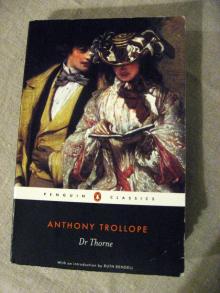 Doctor Thorne
Doctor Thorne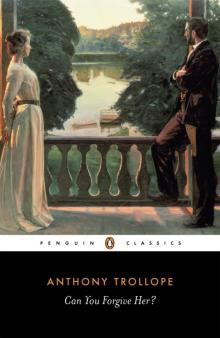 Can You Forgive Her?
Can You Forgive Her?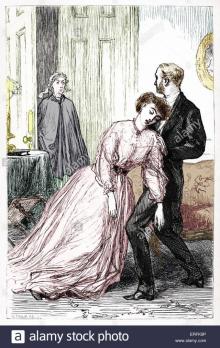 The Last Chronicle of Barset
The Last Chronicle of Barset The Fixed Period
The Fixed Period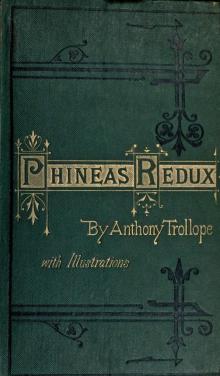 Phineas Redux
Phineas Redux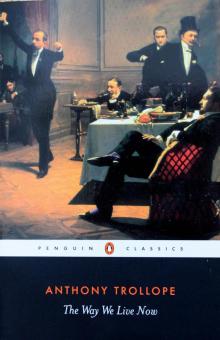 The Way We Live Now
The Way We Live Now Castle Richmond
Castle Richmond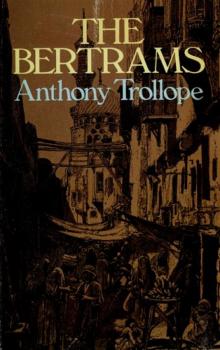 The Bertrams
The Bertrams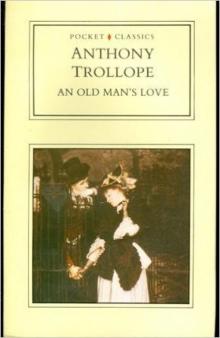 An Old Man's Love
An Old Man's Love The Belton Estate
The Belton Estate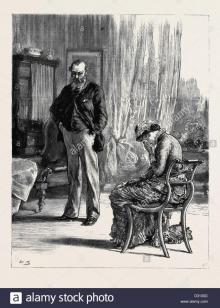 Marion Fay: A Novel
Marion Fay: A Novel The Claverings
The Claverings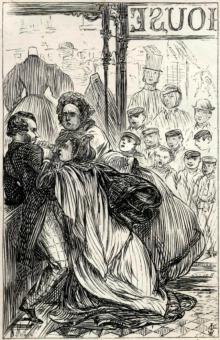 The Struggles of Brown, Jones, and Robinson
The Struggles of Brown, Jones, and Robinson Nina Balatka
Nina Balatka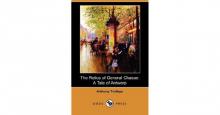 The Relics of General Chasse: A Tale of Antwerp
The Relics of General Chasse: A Tale of Antwerp Barchester Towers cob-2
Barchester Towers cob-2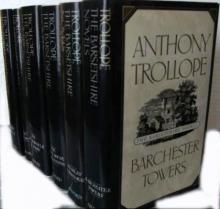 The Chronicles of Barsetshire
The Chronicles of Barsetshire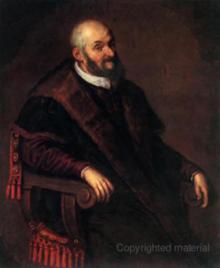 The Warden cob-1
The Warden cob-1 Framley Parsonage
Framley Parsonage Christmas at Thompson Hall
Christmas at Thompson Hall The Warden
The Warden The Palliser Novels
The Palliser Novels The Small House at Allington
The Small House at Allington Barchester Towers
Barchester Towers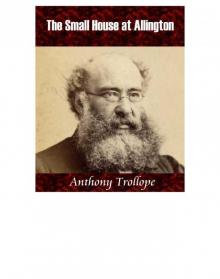 The Small House at Allington cob-5
The Small House at Allington cob-5 The Duke's Children
The Duke's Children Phineas Finn, the Irish Member
Phineas Finn, the Irish Member Autobiography of Anthony Trollope
Autobiography of Anthony Trollope